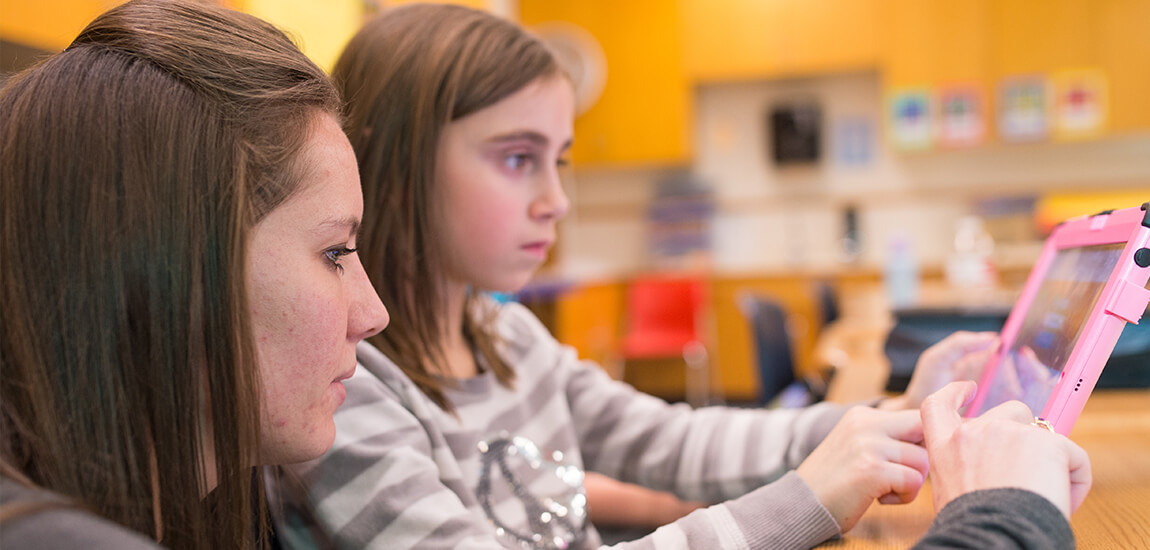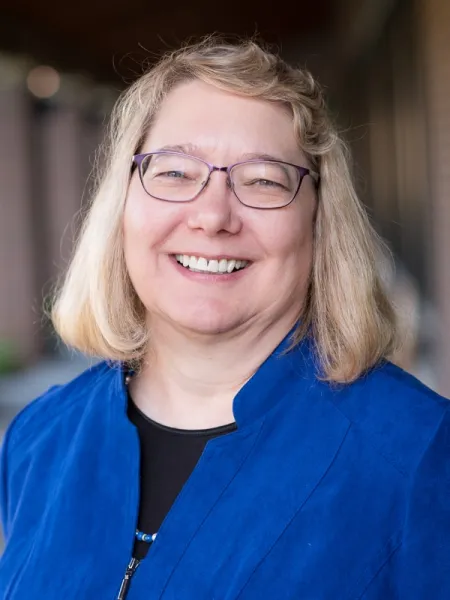Inspire the next generation of children to be creative, compassionate, and to live with integrity. The Elementary Education major prepares you to teach and engage young minds in a public or private school setting from grades K-6. This degree will also prepare you for further graduate study.
This might be the right degree for you if you
- enjoy working with children
- are eager to serve
- are passionate about teaching
Why study elementary education at Northwestern?
You’ll learn professional practices to engage children from diverse backgrounds. Our students develop an appreciation for diversity in the classroom. We integrate classroom preparation into every area of teacher education by linking theory to experience. Our small class sizes enable Christian professors to mentor you and encourage your faith to flourish both in and out of the classroom.
Students who want to complete this undergraduate degree to get their teaching license in elementary education will seek an endorsement to their license. They will receive the endorsement at the time they receive their initial license. Candidates must confirm with the Department of Teacher Education that the endorsement may be added to their chosen major field. Credits that have been applied to the licensure major may be double-counted in the endorsement.
- Communication Arts/Literature Education: Grades 5–8
- Mathematics Education: Grades 5–8
- Social Studies Education: Grades 5–8
- Preprimary: Ages 3–5
Northwestern’s Department of Teacher Education provides you with four levels of classroom practicum experience.
- The first level allows you to find your personal “fit” within the teaching profession.
- The second focuses on developing theory and skills related to diversity.
- The third engages you to apply methodologies within your chosen field by creating, teaching, and evaluating lessons in a school classroom.
- The final level is full-time student teaching in a chosen licensure field.
The Department of Teacher Education provides teacher education programs approved by the Minnesota Professional Educator Licensing and Standards Board. They meet the state standards adopted for licensure programs as defined in state Rule 8710.2000 through 8710.8080. All licensure programs are aligned with the Interstate Teacher Assessment and Support Consortium (INTASC) standards and the Minnesota Standards of Effective Practice.
Request Information
Careers in elementary education
There are a variety of career and academic pathways that begin with a degree in elementary education.
What types of work are related to this degree?
- Teaching in your area of specialty
- Private tutoring
- Creating/directing educational programs
- Curriculum development
- Instructional design (technology training may be required)
- Textbook editing
- Online education
- Student life/student affairs
- Corporate or business training and development
- Nanny
- Children’s ministry
What will I learn?
You will develop effective communication skills and be able to teach children in grades K-6.
EAR 4345
Art Methods for Elementary Teachers
A basic course in art education with emphasis on a comprehensive approach to practices and appreciation of art experiences for elementary school children.
EEL 4327
Kindergarten Methods and the Primary Learner
A study of developmentally appropriate practice for nurturing the growth and development of children ages five through nine years including the interrelatedness of learning environments, classroom community, classroom structure, family-school partnerships and assessment. Strategies for the instruction of different curricular areas are included. Attention is given to the physical, social, emotional, cognitive and spiritual development of children. Field experience in conducting observations and making assessments of children ages five through nine years is an integral part of the course.
EEL 4335
Mathematics Methods for Elementary Teachers K–6
A study of the purposes, methods, instructional materials and evaluation techniques in the teaching of elementary mathematics. The course provides theory, modeling and application of instructional strategies for developing mathematical literacy with elementary learners. The development of instructional skills to support mathematical reasoning, communication and problem solving across the mathematics curriculum is emphasized.
MUE 4345
Music Methods for Elementary Teachers (Grades K–6)
A study of the purposes, methods, instructional materials and evaluation techniques in the teaching of elementary music. The course is designed to provide basic skills for teaching classroom music. Instructional methods for teaching individuals and classes are included, as well as skills and strategies for listening, singing and participation in rhythmic movement. Emphasis is placed on how to play and utilize classroom instruments.

Still have questions about this program or how to apply?
Our team is ready with answers!
Discover the School of Education & Behavioral Sciences
Professors at Northwestern are focused on their students first. Our faculty include experts in their respective fields who want to help you grow in your faith while you earn your degree.



